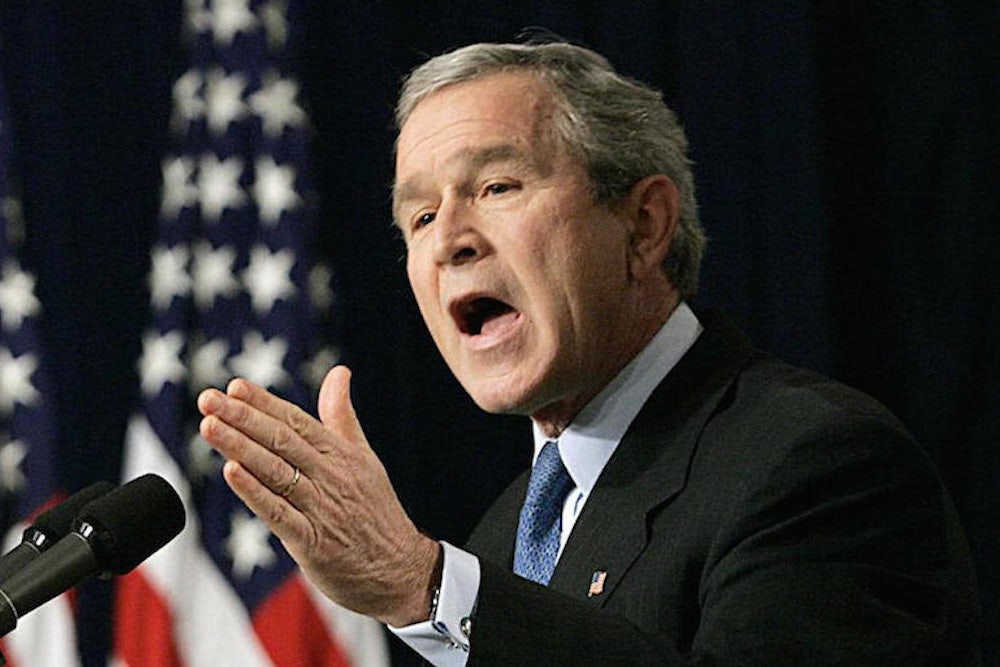On Tuesday, an investigation by veteran New York Times war correspondent C.J. Chivers revealed that between 2004-2011, American troops fighting in the Iraq War found over 5,000 chemical warheads, shells, and aviation bombs. The discoveries were never publicly disclosed by the military; U.S. soldiers who were exposed to nerve agents like sarin and mustard gas while attempting to remove conventional weapons were denied appropriate medical care and ordered to remain silent about yet another miscalculation of the Iraq War.
But in the midst of the revelation about the Bush administration cover-up, conservatives took to Twitter to express vindication for the former President who embarked on the ill-fated war.
.@BenjySarlin Can we also agree that those who mocked any statement that there were WMD's in Iraq in '03 & '04 were/are wrong?
— Brad Dayspring (@BDayspring) October 15, 2014FACT: There were chemical weapons in Iraq. Period. End of story. Have fun @mmfa @voxdotcom @Slate @Salon @tnr
— CounterMoonbat (@CounterMoonbat) October 15, 2014Alright, @CounterMoonbat, I’ll take your bait.
The debate over the legitimacy of the Iraq War was never about whether or not Saddam Hussein possessed weapons of mass destruction at some point in history. It is well known that Saddam Hussein used a variety of chemical weapons against Iran during the Iran-Iraq War of the 1980s—and the U.S., eager to see the destruction of the nascent Islamic Republic of Iran, aided him in creating the program.
But on Septmeber 12, 2002, President Bush described a different threat while making the case for the 2003 Iraq invasion: “Right now, Iraq is expanding and improving facilities that were used for the production of biological weapons.” The Times' investigation doesn't mention any findings of biological weapons.
He went on, “The regime is rebuilding and expanding facilities capable of producing chemical weapons.”
According to the investigation, the chemical weapons discovered by U.S. soldiers after the 2003 invasion were all manufactured before 1991.
Directly addressing the United Nations General Assembly, Bush continued, “We have been more than patient. We have tried sanctions. We have tried the carrot of ‘oil for food’ and the stick of coalition military strikes. But Saddam Hussein has defied all these efforts and continues to develop weapons of mass destruction.”
While Bush’s plea to the international community did not win the blessing of the U.N. Security Council, he used this rhetoric as the justification for invading Iraq and toppling Saddam Hussein. He was not declaring war on a decades-old chemical weapons program, but on an alleged new and ongoing program that could be used to destroy mass civilian populations.
If the post-2003 discovery of a decaying chemical weapons program could serve as proof that the invasion was justified, the Bush White House would have seized the opportunity to proclaim so. By 2005, CIA weapons inspectors concluded in a 92-page report that the WMD investigation had “gone as far as feasible” and found no evidence of an active weapons program. The CIA report included an addendum: “military forces in Iraq may continue to find small numbers of degraded chemical weapons — most likely misplaced or improperly destroyed before the 1991 Gulf War.”
Bush’s approval ratings, which peaked at 70% during the March 2003 invasion, had plummeted to 48% by the time the CIA weighed in. The Administration could have used an example of, "Look, we were right!" But rather than tout the discovery of remnants chemical weapons from the 1980s, the Pentagon went to extreme lengths to cover it up. The harm these weapons posed to U.S. troops was unanticipated and the injuries they were suffering were an embarrassment.
Soldiers whose urine and blood tested positive for mustard gas exposure were given painkillers, antibiotics, and burn cream. Two Army doctors tasked with writing the official textbook on battlefield wound treatment failed to include case studies of chemical weapons exposure because the cases were deliberately kept from them.
U.S. troops told The Times that the military procedures for handling chemical weapons discovered in Iraq discouraged them from reporting their findings. They would often opt to destroy chemical munitions themselves, despite being trained to dismantle conventional bombs.
The existence of aging chemical weapons in Iraq was never the justification for Bush’s invasion, nor was it a secret. The secret was the harm that they were causing to U.S. troops and the subsequent failure to care for these individuals.
